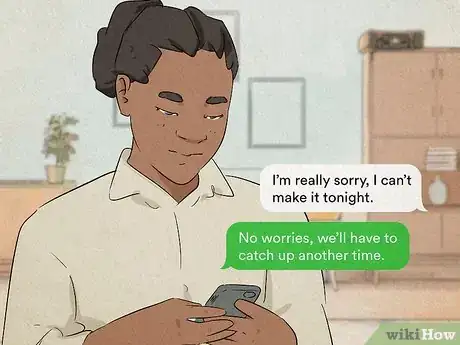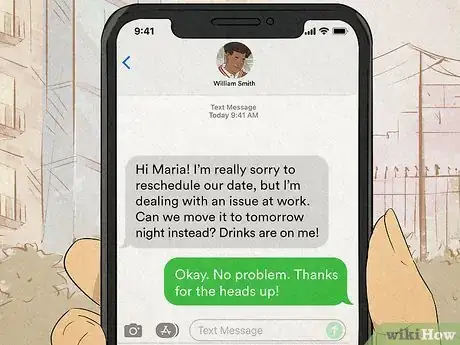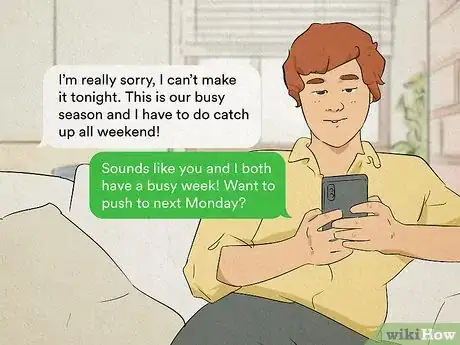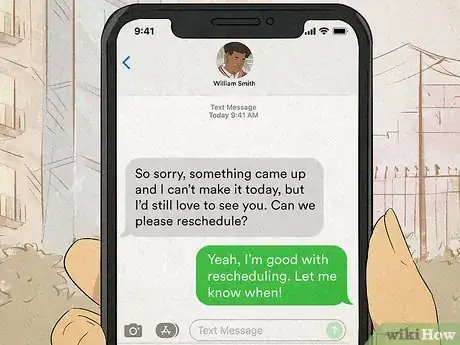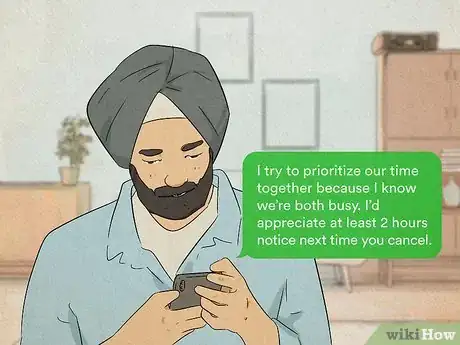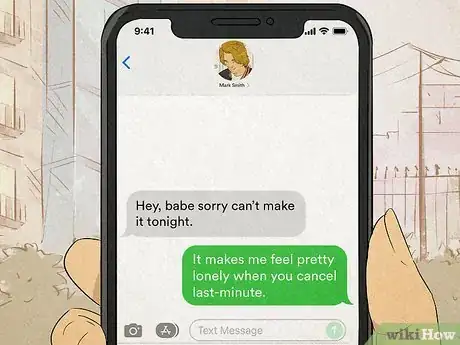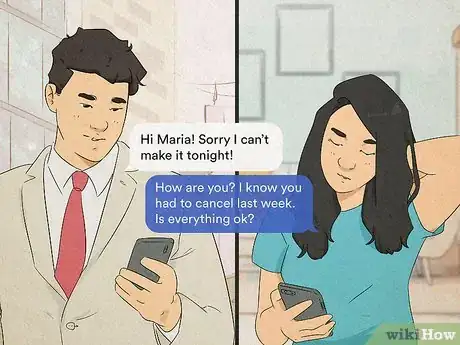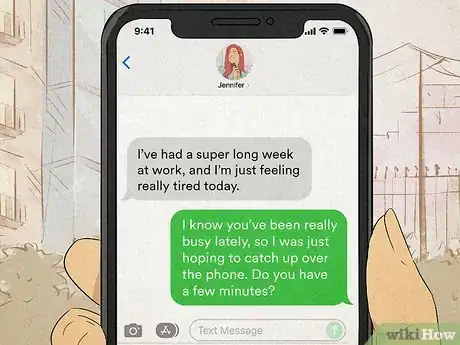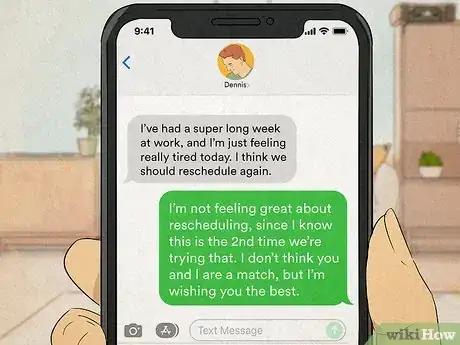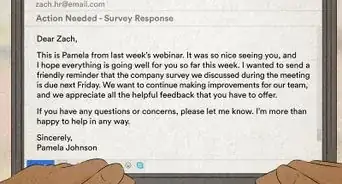This article was co-authored by William Schroeder, MA, LPC, NCC and by wikiHow staff writer, Kira Jan. William Schroeder is a Licensed Professional Counselor and the Co-Owner of Just Mind, a counseling center in Austin, Texas that aims to remove the stigma from therapy. With more than 14 years of experience, he specializes in cognitive counseling with adults on issues such as loss, life transition, happiness, relationships, and career exploration. He has also received advanced training and works with clients with ADHD and Aspergers (ASD). William and Just Mind have been featured in publications such as The New York Times, Business Insider, and Readers Digest. William holds a BBA in Marketing from Loyola University, New Orleans, and an MA in Counseling Psychology from St. Mary’s University.
There are 9 references cited in this article, which can be found at the bottom of the page.
This article has been viewed 69,392 times.
What should you say when someone flakes on you? Whether you’re dealing with a date who just canceled or a chronically flaky friend, we’ve got you covered. We’ve put together a guide to help you reply when someone flakes on you and figure out whether or not that relationship is worth your time.
Steps
Expert Q&A
-
QuestionWhat are the reasons for being flaky?
 William Schroeder, MA, LPC, NCCWilliam Schroeder is a Licensed Professional Counselor and the Co-Owner of Just Mind, a counseling center in Austin, Texas that aims to remove the stigma from therapy. With more than 14 years of experience, he specializes in cognitive counseling with adults on issues such as loss, life transition, happiness, relationships, and career exploration. He has also received advanced training and works with clients with ADHD and Aspergers (ASD). William and Just Mind have been featured in publications such as The New York Times, Business Insider, and Readers Digest. William holds a BBA in Marketing from Loyola University, New Orleans, and an MA in Counseling Psychology from St. Mary’s University.
William Schroeder, MA, LPC, NCCWilliam Schroeder is a Licensed Professional Counselor and the Co-Owner of Just Mind, a counseling center in Austin, Texas that aims to remove the stigma from therapy. With more than 14 years of experience, he specializes in cognitive counseling with adults on issues such as loss, life transition, happiness, relationships, and career exploration. He has also received advanced training and works with clients with ADHD and Aspergers (ASD). William and Just Mind have been featured in publications such as The New York Times, Business Insider, and Readers Digest. William holds a BBA in Marketing from Loyola University, New Orleans, and an MA in Counseling Psychology from St. Mary’s University.
Licensed Professional Counselor Some people may be flaky because they are not good at time management. Overcommitting to things may be another reason for being flaky.
Some people may be flaky because they are not good at time management. Overcommitting to things may be another reason for being flaky. -
QuestionHow can I continue to be friends with a flaky person?
 William Schroeder, MA, LPC, NCCWilliam Schroeder is a Licensed Professional Counselor and the Co-Owner of Just Mind, a counseling center in Austin, Texas that aims to remove the stigma from therapy. With more than 14 years of experience, he specializes in cognitive counseling with adults on issues such as loss, life transition, happiness, relationships, and career exploration. He has also received advanced training and works with clients with ADHD and Aspergers (ASD). William and Just Mind have been featured in publications such as The New York Times, Business Insider, and Readers Digest. William holds a BBA in Marketing from Loyola University, New Orleans, and an MA in Counseling Psychology from St. Mary’s University.
William Schroeder, MA, LPC, NCCWilliam Schroeder is a Licensed Professional Counselor and the Co-Owner of Just Mind, a counseling center in Austin, Texas that aims to remove the stigma from therapy. With more than 14 years of experience, he specializes in cognitive counseling with adults on issues such as loss, life transition, happiness, relationships, and career exploration. He has also received advanced training and works with clients with ADHD and Aspergers (ASD). William and Just Mind have been featured in publications such as The New York Times, Business Insider, and Readers Digest. William holds a BBA in Marketing from Loyola University, New Orleans, and an MA in Counseling Psychology from St. Mary’s University.
Licensed Professional Counselor If your friend is flaky, do not take it personally. Accept it and use strategies to cope up with their flakiness. For example, invite those who do not flake on plans along with your flaky friend. If the flaky friend comes, it will be nice. But if they do not come, it will not make much difference to you.
If your friend is flaky, do not take it personally. Accept it and use strategies to cope up with their flakiness. For example, invite those who do not flake on plans along with your flaky friend. If the flaky friend comes, it will be nice. But if they do not come, it will not make much difference to you.
References
- ↑ https://www.gq-magazine.co.uk/article/how-to-deal-with-rejection
- ↑ William Schroeder, MA, LPC, NCC. Licensed Professional Counselor. Expert Interview. 28 September 2021.
- ↑ https://science.howstuffworks.com/life/inside-the-mind/emotions/why-do-people-keep-flaking-out.htm
- ↑ https://www.inc.com/minda-zetlin/canceling-plans-gracefully-without-hurting-relationsips.html
- ↑ https://www.inc.com/minda-zetlin/canceling-plans-gracefully-without-hurting-relationsips.html
- ↑ https://www.psychologytoday.com/us/blog/the-art-closeness/201511/how-your-flaky-friend-may-have-gotten-way
- ↑ https://www.cosmopolitan.com/sex-love/a60443/mixed-signals-guys-matthew-hussey/
- ↑ William Schroeder, MA, LPC, NCC. Licensed Professional Counselor. Expert Interview. 28 September 2021.
- ↑ https://science.howstuffworks.com/life/inside-the-mind/emotions/why-do-people-keep-flaking-out.htm
- ↑ https://www.psychologytoday.com/us/blog/the-art-closeness/201511/how-your-flaky-friend-may-have-gotten-way
- ↑ https://science.howstuffworks.com/life/inside-the-mind/emotions/why-do-people-keep-flaking-out.htm
- ↑ https://www.cnn.com/2014/03/11/living/upwave-flake-out/index.html
- ↑ William Schroeder, MA, LPC, NCC. Licensed Professional Counselor. Expert Interview. 28 September 2021.
- ↑ https://www.psychalive.org/how-to-deal-with-rejection/
- ↑ https://ideas.ted.com/why-rejection-hurts-so-much-and-what-to-do-about-it/
